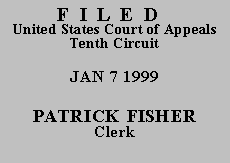 UNITED STATES COURT OF APPEALS
UNITED STATES COURT OF APPEALS
 UNITED STATES COURT OF APPEALS
UNITED STATES COURT OF APPEALS
TENTH CIRCUIT
| DON M. WEBER, II, | |
| v. | No. 98-3172 |
| LEASEWAY DEDICATED LOGISTICS, INC., formerly known as Leaseway Logistics Service, a California corporation, | (D.C. No. 97-CV-2209-GTV)
(D. Kan.) (5 F.Supp.2d 1219) |
ORDER AND JUDGMENT(*)
Before SEYMOUR, Chief Judge, BALDOCK, and HENRY, Circuit Judges.(**)
Plaintiff Don M. Weber appeals the district court's grant of summary judgment in favor of Defendant Leaseway Dedicated Logistics, Inc. (hereafter "Leaseway") under Fed. R. Civ. P. 56. Also before the court is Plaintiff's motion to proceed on appeal in forma pauperis. In his complaint, Plaintiff asserted that Defendant discriminated against him because of his religious beliefs in violation of Title VII of the Civil Rights Act of 1964, 42 U.S.C. § 2000e et seq., when Defendant refused to hire Plaintiff unless he provided Defendant with his social security number. Our jurisdiction arises under 28 U.S.C. § 1291. We review the district court's grant of summary judgment de novo, using the same standard applied by the district court. Aramburu v. The Boeing Co., 112 F.3d 1398, 1402 (10th Cir. 1997). We grant Plaintiff's motion to proceed in forma pauperis, and affirm the district court.
Plaintiff refuses to obtain or use a social security number because he claims it represents the "mark of the beast" as described in the Book of Revelations in the Bible. In April 1996, Plaintiff applied for a position as a truck driver with Defendant. On the application for employment Plaintiff refused to provide a social security number. Defendant did not hire Plaintiff and informed him that he would not be hired without a social security number.
We analyze Title VII religious discrimination claims under a burden-shifting approach. See Toledo v. Nobel-Sysco, Inc., 892 F.2d 1481, 1486 (10th Cir. 1989). First the employee must establish a prima facie case of religious discrimination by showing that (1) he has a bona fide religious belief in conflict with an employment requirement; (2) he informed the employer of the belief; and (3) he was not hired because he failed to satisfy the requirement. Id. Once the plaintiff has established a prima facie case, the burden shifts to the employer to show that a reasonable accommodation would result in undue hardship to the employer. 42 U.S.C. § 2000e(j); Lee v. ABF Freight Sys., Inc., 22 F.3d 1019, 1022 (10th Cir. 1994) The district court concluded that Plaintiff could not establish a prima facie case. The district court further concluded that assuming arguendo that Plaintiff met his burden, his claim would still fail because accommodating Plaintiff would place an undue hardship on Defendant. We agree with the district court's conclusion that accommodating Plaintiff would place an undue hardship on Defendant.
Under federal law, all employers are required to withhold certain income taxes and social security taxes and file a report with the Internal Revenue Service as to each individual employee. These reports require identification of the employee by social security number. 26 U.S.C. § 6109; 26 C.F.R. §§ 31.6109-1, 31.6051-1(a)(1). Requiring Defendant to violate these laws in order to accommodate Plaintiff would result in undue hardship to Defendant. See United States v. Board of Educ., 911 F.2d 882, 891 (3rd Cir. 1990) (requiring defendant to violate state statute to accommodate plaintiff resulted in undue hardship); see also Droz v. Commissioner of IRS, 48 F.3d 1120, 1123 (9th Cir. 1995) (compulsory participation in the social security system, where the plaintiff's objection is based on religious grounds, is not unconstitutional).
Furthermore, by accommodating Plaintiff's refusal to provide a social security number, Defendant would be subject to penalties from the IRS for not reporting the employee's social security number. See 26 U.S.C. §§ 6722, 6723. To require an employer to subject itself to potential fines also results in undue hardship. See Lee, 22 F.3d at 1023. In response, Plaintiff argues that Defendant would not be subject to undue hardship because Defendant could receive a waiver of penalties under 26 U.S.C. § 6724. Section 6724(a) provides that "[n]o penalty shall be imposed under this part with respect to any failure if it is shown that such failure is due to reasonable cause and not to willful neglect." Plaintiff cited no authority to support his contention that the Internal Revenue Service would find that Defendant's omission of Plaintiff's social security number was due to "reasonable cause." Cf. EEOC v. Allendale Nursing Centre, 996 F.Supp. 712, 718 (W.D. Mich. 1998) (employer under no obligation to seek § 6724 waiver in order to accommodate Plaintiff). Therefore, we reject Plaintiff's argument. For these reasons, the judgment of the district court is
AFFIRMED.
Entered for the Court,
Bobby R. Baldock
Circuit Judge
*. This order and judgment is not binding precedent, except under the doctrines of law of the case, res judicata, and collateral estoppel. The court generally disfavors the citation of orders and judgments; nevertheless, an order and judgment may be cited under the terms and conditions of 10th Cir. R. 36.3.
**. After examining the briefs and appellate record, this panel has determined that oral argument would not materially assist the determination of this appeal. See Fed. R. App. P. 34(a) (2)(C); 10th Cir. R. 34.1(G). The case is therefore ordered submitted without oral argument.